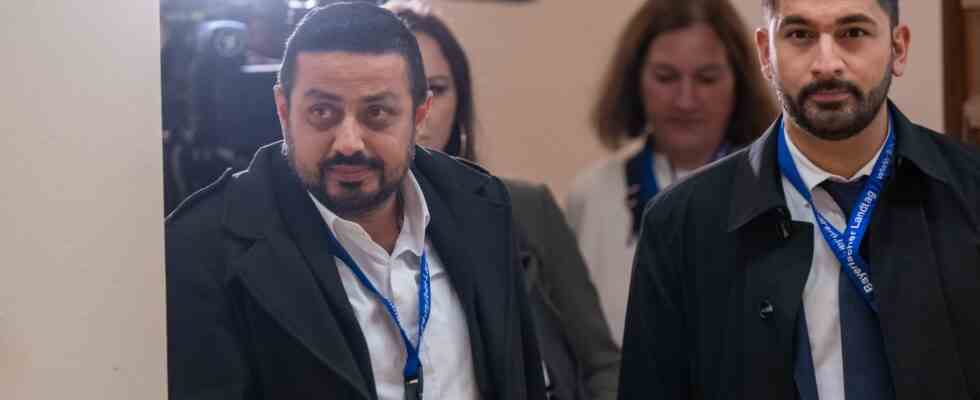Status: 25.10.2022 4:10 a.m
The investigative committee of the Bavarian state parliament focuses on the so-called flashlight attack by the NSU in 1999. For this, the committee invited the then victim Mehmet O.
Mehmet O. has been waiting for this day for 23 years: for the first time he can testify publicly and tell how the bomb attack changed his life forever. The 42-year-old is the first victim of the NSU. When he met some supporters not far from the Bavarian state parliament, it was pouring rain. The group organized a rally for him. He was excited, he says there. And that he wanted recognition for what was done to him.
Pipe bomb disguised as a flashlight
It’s June 23, 1999. The big flashlight is in the men’s toilet of his restaurant in Nuremberg. Mehmet O. finds her cleaning up. When he turns it on, the camouflaged pipe bomb detonates. The blast threw the then 18-year-old through the room. The German-Turk only survived the attack through luck.
The Nuremberg bar “Sonnenschein” in whose toilet a pipe bomb exploded in 1999, which is attributed to the “National Socialist Underground” (NSU).
Image: dpa
The police then searched for the perpetrator in his area. “I wasn’t the victim, I was the culprit,” says Mehmet O. about the investigations at the time. The case was later dropped with no results.
It was not until 2013 that one of the accused in the NSU trial made the connection: the bomb attack was the first act of the “National Socialist Underground” (NSU). Officials from the Federal Criminal Police Office then presented photos to Mehmet O. He recognizes a close friend of Beate Zschäpe. But the self-confessed National Socialist was never questioned.
Evidence goes into collection of teaching materials
So far, the so-called “flashlight attack” in Nuremberg has not been dealt with either legally or in parliament. The investigative committee in Munich now wants to catch up. For example, the committee questions why the public prosecutor’s office in Nuremberg-Fürth only investigated negligent bodily harm in 1999.
That was definitely a mistake, says committee chairman Toni Schuberl from the Greens. “We have to find out what impact that had.” Mehmet Os’ lawyer Engin Sanli is certain: if attempted murder had been investigated, the evidence would still be there and could be examined for DNA traces. The pipe bomb, disguised as a flashlight, went to a police collection of teaching aids as illustrative material, making any possible traces useless.
Attorney Sanli also believes that investigations might then have been brought together. A year earlier, in 1998, the police found explosives and pipe bombs in Beate Zschäpe’s garage in Jena. Then the NSU trio disappeared. Could a connection to the NSU have been established back then?
“My life was ruined”
There are many unanswered questions regarding the flashlight attack. Also for Mehmet O.: Why did the attack hit him of all people? Did the NSU core trio Beate Zschäpe, Uwe Mundlos and Uwe Böhnhardt have helpers in Nuremberg? The White Rose Hall in the state parliament is almost full when Mehmet O. enters the room with his lawyer and his victim advisor. In front of the committee, he describes the attack and its consequences, from which he is still suffering today. He was afraid for his life, he tells MPs. He lost his job and friends. Eventually he left his hometown of Nuremberg. “My life was ruined,” said Mehmet O.
The committee members question the first victim of the NSU, some critically. Mehmet O. contradicts, among other things, his own statement from 23 years ago. It’s about the number of guests in his bar the night before the attack or when he left the bar. Patrycia Kowalska from the consulting network BUD Bayern, accompanies Mehmet O. in his statement. She criticizes the way parliamentarians were questioned: “At times we experienced cross-examination without understanding for an 18-year-old who survived an attack and was suspected of having built the bomb himself.”
The committee chairman, Toni Schuberl, from the Greens justifies the questioning. “It’s important for us to document and process this complex comprehensively, because we’re the only authority that can do that.” And he adds: For the assessment of the fact that Mehmet O. is a victim of the NSU, the contradictory statements are irrelevant. The 42-year-old is close to tears when he leaves the White Rose Hall. In a moment he felt like a guilty party again. And then Mehmet O. adds: “But they also said that they see me as a victim.” At least he achieved this goal, even if it was a difficult day for him.

